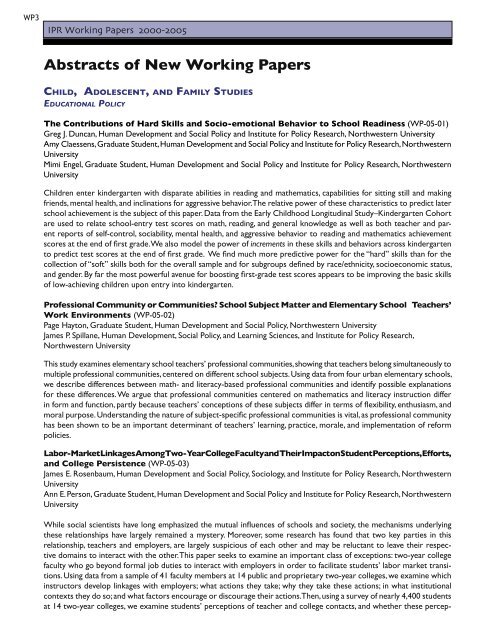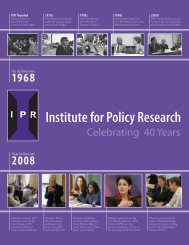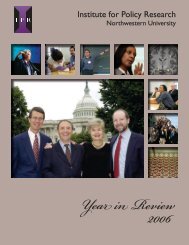Whatever Happened to the Emerging Democratic Majority?
Whatever Happened to the Emerging Democratic Majority?
Whatever Happened to the Emerging Democratic Majority?
You also want an ePaper? Increase the reach of your titles
YUMPU automatically turns print PDFs into web optimized ePapers that Google loves.
WP3<br />
IPR Working Papers 2000-2005<br />
Abstracts of New Working Papers<br />
Child, Adolescent, and Family Studies<br />
Educational Policy<br />
The Contributions of Hard Skills and Socio-emotional Behavior <strong>to</strong> School Readiness (WP-05-01)<br />
Greg J. Duncan, Human Development and Social Policy and Institute for Policy Research, Northwestern University<br />
Amy Claessens, Graduate Student, Human Development and Social Policy and Institute for Policy Research, Northwestern<br />
University<br />
Mimi Engel, Graduate Student, Human Development and Social Policy and Institute for Policy Research, Northwestern<br />
University<br />
Children enter kindergarten with disparate abilities in reading and ma<strong>the</strong>matics, capabilities for sitting still and making<br />
friends, mental health, and inclinations for aggressive behavior. The relative power of <strong>the</strong>se characteristics <strong>to</strong> predict later<br />
school achievement is <strong>the</strong> subject of this paper. Data from <strong>the</strong> Early Childhood Longitudinal Study–Kindergarten Cohort<br />
are used <strong>to</strong> relate school-entry test scores on math, reading, and general knowledge as well as both teacher and parent<br />
reports of self-control, sociability, mental health, and aggressive behavior <strong>to</strong> reading and ma<strong>the</strong>matics achievement<br />
scores at <strong>the</strong> end of first grade. We also model <strong>the</strong> power of increments in <strong>the</strong>se skills and behaviors across kindergarten<br />
<strong>to</strong> predict test scores at <strong>the</strong> end of first grade. We find much more predictive power for <strong>the</strong> “hard” skills than for <strong>the</strong><br />
collection of “soft” skills both for <strong>the</strong> overall sample and for subgroups defined by race/ethnicity, socioeconomic status,<br />
and gender. By far <strong>the</strong> most powerful avenue for boosting first-grade test scores appears <strong>to</strong> be improving <strong>the</strong> basic skills<br />
of low-achieving children upon entry in<strong>to</strong> kindergarten.<br />
Professional Community or Communities? School Subject Matter and Elementary School Teachers’<br />
Work Environments (WP-05-02)<br />
Page Hay<strong>to</strong>n, Graduate Student, Human Development and Social Policy, Northwestern University<br />
James P. Spillane, Human Development, Social Policy, and Learning Sciences, and Institute for Policy Research,<br />
Northwestern University<br />
This study examines elementary school teachers’ professional communities, showing that teachers belong simultaneously <strong>to</strong><br />
multiple professional communities, centered on different school subjects. Using data from four urban elementary schools,<br />
we describe differences between math- and literacy-based professional communities and identify possible explanations<br />
for <strong>the</strong>se differences. We argue that professional communities centered on ma<strong>the</strong>matics and literacy instruction differ<br />
in form and function, partly because teachers’ conceptions of <strong>the</strong>se subjects differ in terms of flexibility, enthusiasm, and<br />
moral purpose. Understanding <strong>the</strong> nature of subject-specific professional communities is vital, as professional community<br />
has been shown <strong>to</strong> be an important determinant of teachers’ learning, practice, morale, and implementation of reform<br />
policies.<br />
Labor-Market Linkages Among Two-Year College Faculty and Their Impact on Student Perceptions, Efforts,<br />
and College Persistence (WP-05-03)<br />
James E. Rosenbaum, Human Development and Social Policy, Sociology, and Institute for Policy Research, Northwestern<br />
University<br />
Ann E. Person, Graduate Student, Human Development and Social Policy and Institute for Policy Research, Northwestern<br />
University<br />
While social scientists have long emphasized <strong>the</strong> mutual influences of schools and society, <strong>the</strong> mechanisms underlying<br />
<strong>the</strong>se relationships have largely remained a mystery. Moreover, some research has found that two key parties in this<br />
relationship, teachers and employers, are largely suspicious of each o<strong>the</strong>r and may be reluctant <strong>to</strong> leave <strong>the</strong>ir respective<br />
domains <strong>to</strong> interact with <strong>the</strong> o<strong>the</strong>r. This paper seeks <strong>to</strong> examine an important class of exceptions: two-year college<br />
faculty who go beyond formal job duties <strong>to</strong> interact with employers in order <strong>to</strong> facilitate students’ labor market transitions.<br />
Using data from a sample of 41 faculty members at 14 public and proprietary two-year colleges, we examine which<br />
instruc<strong>to</strong>rs develop linkages with employers; what actions <strong>the</strong>y take; why <strong>the</strong>y take <strong>the</strong>se actions; in what institutional<br />
contexts <strong>the</strong>y do so; and what fac<strong>to</strong>rs encourage or discourage <strong>the</strong>ir actions. Then, using a survey of nearly 4,400 students<br />
at 14 two-year colleges, we examine students’ perceptions of teacher and college contacts, and whe<strong>the</strong>r <strong>the</strong>se percep-
















